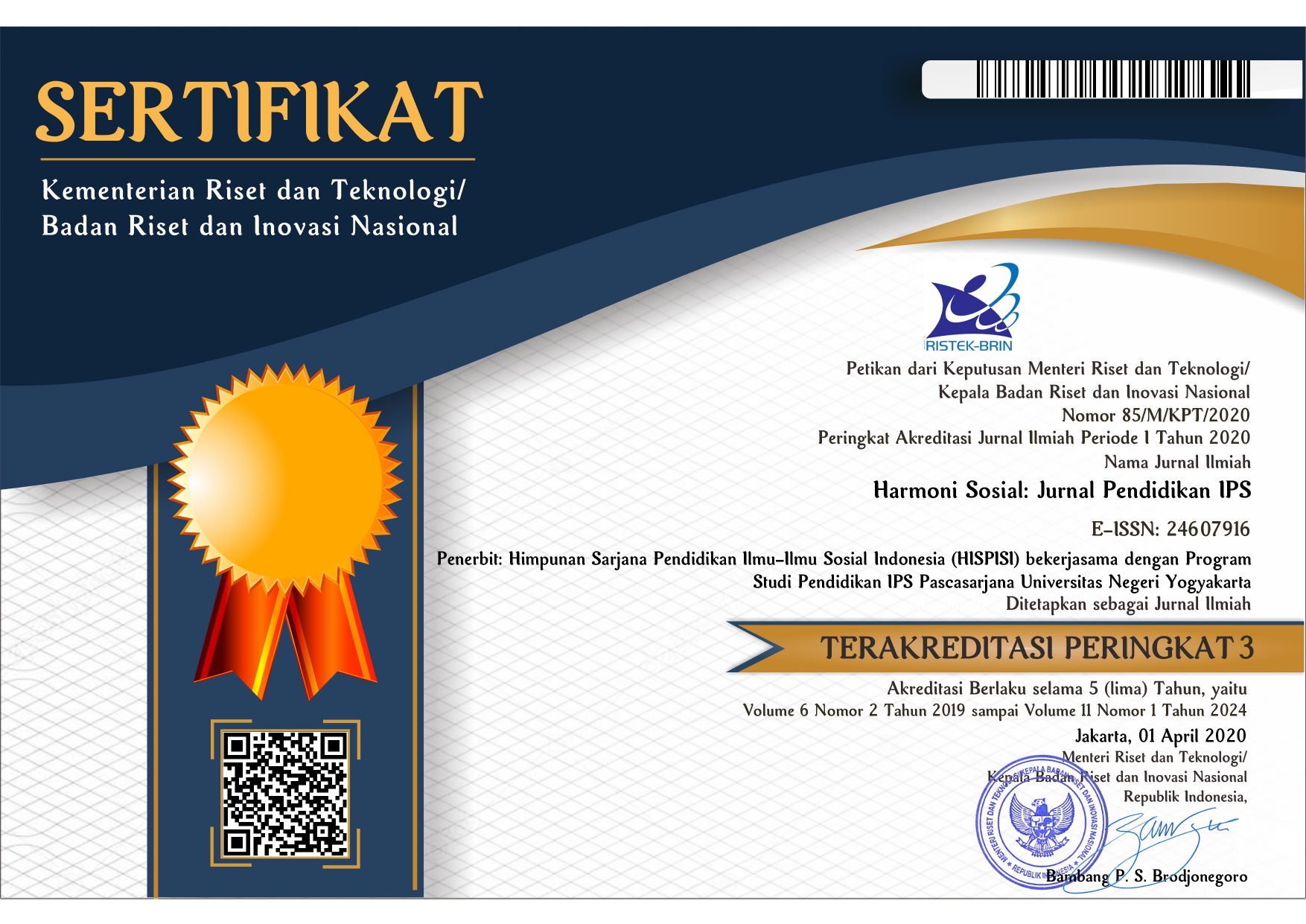The effect of intensity of MGMP activities, school climate, and work commitments on the professionalism of economics high school teachers
Risky Setiawan, Universitas Negeri Yogyakarta, Indonesia
Abstract
This study aims to determine the effect of the intensity of MGMP activities, school climate, and teacher work commitment on the professionalism of high school teachers in Economics in the City of Yogyakarta. This research is an ex-post facto research with a quantitative approach. This research is a population study, where the research subjects were all high school economics teachers in Yogyakarta, where the technique of collecting subjects used was saturated sampling. Data were obtained by non-test through questionnaires, interviews, and documentation. Validity testing is done by Expert Judgment and Confirmatory Factor Analysis (CFA). Reliability testing uses Cronbach's Alpha (α). Data analysis using multiple regression statistical techniques. The results showed that the intensity of MGMP activities had an effect on teacher professionalism with an R-squared value of 14.2%, school climate had an impact on teacher professionalism with an R-squared value of 28%, and work commitment had an effect on teacher professionalism with an R squared value of 9.3%.
Keywords
Full Text:
PDFReferences
Aldridge, J., & Templeton, R. A. (1999). School climate: Measuring, improving and sustaining healthy learning environments. Learning Environments Research, 2(3), 331–334. https://doi.org/10.1023/A:1009926031342
Australian Institute for Teaching and School Leadership. (2018). Australian Professional Standards for Teachers. Australian Institute for Teaching and School Leadership (AITSL). https://www.aitsl.edu.au/docs/default-source/national-policy-framework/australian-professional-standards-for-teachers.pdf
Bennewitz, J., Reinsch, N., Guiard, V., Fritz, S., Thomsen, H., Looft, C., Kühn, C., Schwerin, M., Weimann, C., Erhardt, G., Reinhardt, F., Reents, R., Boichard, D., & Kalm, E. (2004). Multiple quantitative trait loci mapping with cofactors and application of alternative variants of the false discovery rate in an enlarged granddaughter design. Genetics, 168(2), 1019–1027. https://doi.org/10.1534/genetics.104.030296
Evans, L. (2008). Professionalism, professionality and the development of education professionals. British Journal of Educational Studies, 56(1), 20–38. https://doi.org/10.1111/j.1467-8527.2007.00392.x
Herlini, F. H., Nurjanah, S., & Sari, S. I. N. (2012). Pengaruh kualitas kegiatan Musyawarah Guru Mata Pelajaran (MGMP) terhadap profesionalisme guru ekonomi pada SMA Negeri di Jakarta. Econosains Jurnal Online Ekonomi Dan Pendidikan, 10(2), 251–264. https://doi.org/10.21009/econosains.0102.07
Kartini, T. (2011). Faktor-faktor yang mempengaruhi kompetensi profesional guru di SMK Negeri 1 Losarang Kabupaten Indramayu [Universitas Indonesia]. https://lib.ui.ac.id/detail.jsp?id=20292748#
Kementerian Pendidikan dan Kebudayaan Republik Indonesia. (2016). Peringkat dan capaian PISA Indonesia mengalami peningkatan. Kemdikbud.Go.Id. https://www.kemdikbud.go.id/main/blog/2016/12/peringkat-dan-capaian-pisa-indonesia-mengalami-peningkatan
Mulyasa, E. (2006). Kurikulum Tingkat Satuan Pendidikan : Sebuah panduan praktis (M. Mukhlis (ed.)). Remaja Rosdakarya.
Mulyasa, E. (2010). Menjadi guru profesional : Menciptakan pembelajaran kreatif dan menyenangkan (M. Mukhlis (ed.)). Remaja Rosdakarya.
Naibaho, T., Silitonga, D., Supriatna, U., Khusnah, W. D., Rema, F. X., Bela, M. E., Febriyanti, R., Qomariyah, U. N., & Sofa, M. (2021). Manajemen mutu pendidikan (T. S. Tambunan (ed.)). Media Sains Indonesia.
Neil, A. L., & Christensen, H. (2009). Efficacy and effectiveness of school-based prevention and early intervention programs for anxiety. Clinical Psychology Review, 29(3), 208–215. https://doi.org/10.1016/j.cpr.2009.01.002
Queensland College of Teachers. (2012). An investigation of best practice in evidence-based assessment within preservice teacher education programs and other professions. The University of Queensland. https://cdn.qct.edu.au/pdf/BestPpracticeEvidenceBasedAsessmentPreserviceReacherEdPrograms.PDF
Rubio, C. M. (2009). Effective teachers-professional and personal skills. ENSAYOS. Revista de La Facultad de Educación de Albacete, 24, 35–46. https://redined.educacion.gob.es/xmlui/handle/11162/218808
Solomon, M. R. (2009). Consumer behavior : Buying, baving, and being (8th ed.). Pearson Prentice Hall.
Sugiyono, S. (2007). Statistika untuk penelitian (A. Nuryanto (ed.)). Alfabeta.
Sugiyono, S. (2017). Metode penelitian dan pengembangan untuk bidang pendidikan, manajemen, sosial, teknik: Research and development/R&D. Alfabeta.
Suyanto, A. J. (2013). Menjadi guru profesional : Strategi meningkatkan kualifikasi dan kualitas di era globalisasi. Esensi.
Tanang, H., & Abu, B. (2014). Teacher professionalism and professional development practices in South Sulawesi, Indonesia. Journal of Curriculum and Teaching, 3(2), 25–42. https://doi.org/10.5430/jct.v3n2p25
Yamin, S., & Kurniawan, H. (2009). SPSS complete: Teknik analisis statistik terlengkap dengan software SPSS. Salemba Infotek.
DOI: https://doi.org/10.21831/hsjpi.v8i2.8548
Refbacks
- There are currently no refbacks.
Copyright (c) 2022 Harmoni Sosial: Jurnal Pendidikan IPS

This work is licensed under a Creative Commons Attribution-ShareAlike 4.0 International License.
Our journal indexed by:
Printed ISSN (p-ISSN): 2356-1807 | Online ISSN (e-ISSN): 2460-7916
 This work is licensed under a Creative Commons Attribution-ShareAlike 4.0
This work is licensed under a Creative Commons Attribution-ShareAlike 4.0




















